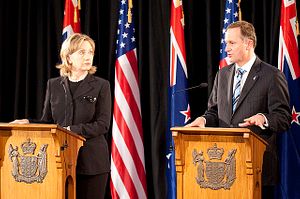After an almost decade-long campaign spanning two governments, New Zealand has secured a seat at the UN’s top table. While the victory owes in part to a no-confidence vote in Turkey, the campaign’s success appears to lend credence to the popular New Zealand national self-image of an innovative country that has a reputation for being a good international citizen.
Unable to throw around a large development budget, New Zealand has had to be creative with its campaign, which has involved everything from building an iPhone app version of the UN Handbook to hosting a cricket game on the UN lawn for South Asian and Caribbean dignitaries. The campaign has demonstrated New Zealand’s impressive ability to market itself internationally and the win is a testament to the ability of small states to harness the soft power of attraction to secure gains in the international system.
But while the seat gives New Zealand an opportunity to effect positive change and engage with the big players, it will also present a challenge to the pragmatic and discreet style of diplomacy fashioned by the Key government by putting New Zealand’s foreign policy under a new level of scrutiny both at home and abroad.
Almost as soon as the votes were counted Minister of Foreign Affairs Murray McCully conceded that New Zealand may have to “choose to annoy some of our friends sometimes.” New Zealand’s Ambassador to the UN Jim McClay was equally quick to declare he is not concerned about voting against major trading partners.
But the compartmentalization of security and trade issues is easier said than done, especially given that the seat comes at a time when the council is trying to navigate some of the most difficult challenges to international security in its history, in the context of an historic shift in the global distribution of power.
For its part, New Zealand is struggling to get the Trans-Pacific Partnership across the line and recently found out just how dependent it has become on dairy exports to China following a food safety scare.
Looking over New Zealand’s response to recent international events one can discern a pattern of passive and mild responses from New Zealand to security issues that involve trading partners. One commentator has even questioned whether New Zealand is developing a neutralist foreign policy.
In part this is a strength of New Zealand – to be a listener rather than a lecturer – but for a small country with an export-oriented economy it also indicates that Wellington has been putting pragmatism over principle.
The most oft-cited example of this is the strategic tug-of-war between the United States and its biggest trading partner China, with New Zealand caught somewhere in the middle. Victoria University’s Professor of Strategic Studies Robert Ayson has described New Zealand as taking “an exceptionally low profile” in response to issues such as the declaration of an Air Defence Identification Zone by the PRC.
But it is not only the U.S.-China rivalry: New Zealand has taken a quiet and balanced approach to the Israeli-Palestinian dispute, the Iranian nuclear program, and the Russian annexation of Crimea. Wellington has been so low key about the Israeli-Palestinian dispute that Israel did not realize the New Zealand ambassador was also accredited to the Palestinian Authority, causing a recent diplomatic standoff.
For a country that has campaigned on being above the sort of self-serving politics that have paralyzed the Security Council there are tremendous expectations that New Zealand will be able to put self-interest aside. But the question remains: If New Zealand is so unafraid of speaking truth to power then why has it been so quiet?
Jeremy Todd is a Master of International Relations candidate at Victoria University, Wellington.
































